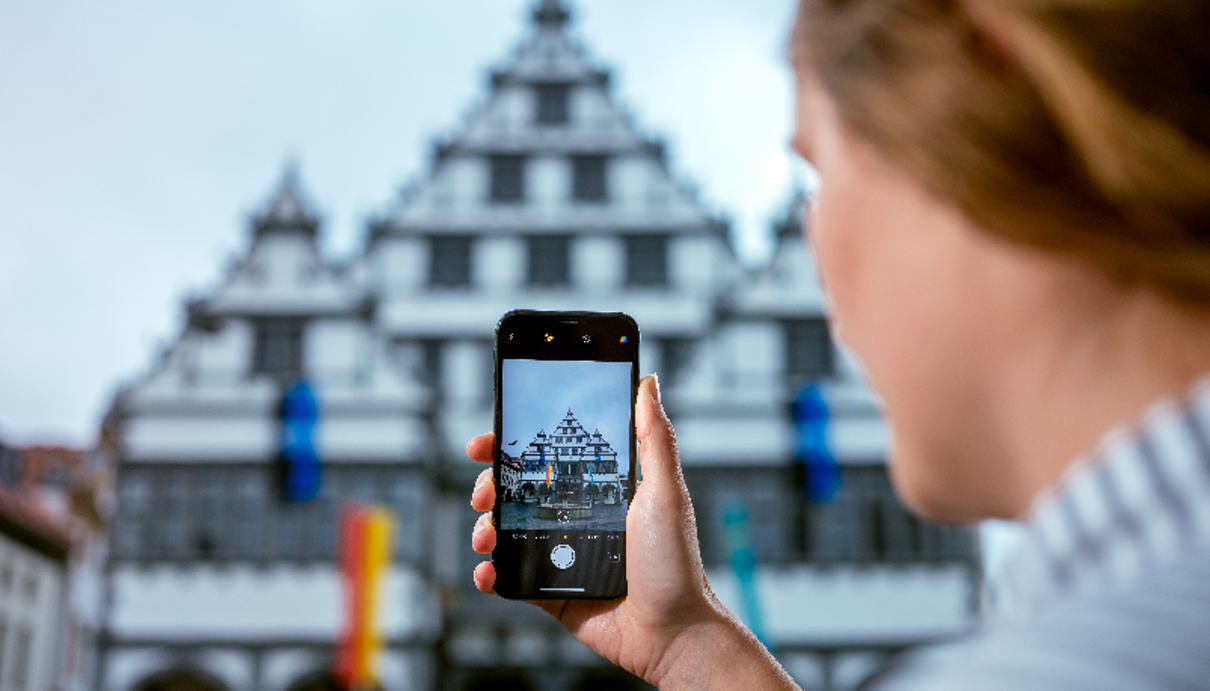Page content
Paderborn – on the way to becoming a smart city

It all kicked off in 2017 with a competition held by Bitkom entitled ’Digitale Stadt’ (Digital City), in which Paderborn took second place. The city was quick to establish a Digitalisation Department, its aim being to “maintain and continue to develop Paderborn as a forward-looking, sustainable, safe and above all liveable city“, says Christiane Boschin-Heinz, Paderborn’s chief digital officer (CDO). “We want to create a smart city that puts citizens first. The aim is that digitalisation in various spheres of life will lead to improvements in intermodal transport, education, art and culture and further progress in environmental and climate protection, for example. It is vital for technology not to be an end in itself but to offer noticeable benefits instead.“
From an online citizens’ centre to open data
Paderborn has already succeeded in getting many digital projects under way – in particular with funding from the state of North Rhine-Westphalia and the federal government. The city has received 20 million euros for developing the local region. The federal government has contributed close to an additional 15 million euros via the ’Smart Cities Made in Germany’ programme. This has made it possible to initiate and in some cases implement the following projects:
- Online citizens’ centre – Mein DigiPort – currently some 150 different requests can be submitted online. The online citizens’ centre was set up in early 2020, since when 900,000 visitors have obtained information and submitted requests online.
- Digital twin – Paderborn is in the process of establishing a digital twin for the areas of urban planning/development, energy and transport. The aim is to identify excessively warm areas in order to improve the urban climate in the long term.
- Digital Infrastructure – Expansion of the digital infrastructure continues with the help of LoRaWAN and WLANFREIFUNK e.V.
- IoT Parking space management – Using sensors and intelligent displays, Paderborn is making it easier to find inner-city parking places.
- RADar – Using an app, the citizens of Paderborn can report damage to road surfaces or obstacles to barrier-free travel on cycle lanes.
- Paderborn, a place of learning – 37 of the city’s schools are networked through this project, which facilitates and encourages learning. More than 20,000 students possess a network ID.
- Library for young people – Rather than focus on dusty old books, Paderborn is investing in Digital Tuesday, which features workshops on TikTok videos, fake news and the Social Media Base Camp on hate speech.
- Inspire – Paderborn is an “integrated security pilot region“. This networks various civilian emergency defence measures such as drones, social media and crowd flow measuring methods.
- Central open data platform – All collected data must be publicly accessible and made available for use. “Protecting our citizens’ data has top priority“, says Christiane Boschin-Heinz.
The “digital home town“ of Paderborn as a trademark
In order to involve the city’s local citizens in the project at an early stage, in 2019 Paderborn established the “digital home town of Paderborn“ as a trademark. A large number of smaller projects have also been implemented that specifically benefit the people of Paderborn as residents of a smart city, says Boschin-Heinz. They include finding available parking by smartphone, the online citizens’ centre and the citykeyApp Paderborn. To make sure the over sixty-fives are not left behind, the city offers information in analogue format – something that the pandemic interfered with these last two years. “However, we are already looking forward to that changing again“, says Boschin-Heinz.
Paderborn is already a smart city – but the journey continues
“With our wide-ranging services we have already become a smart city that continues to move forward with great strides“, says Christiane Boschin-Heinz. Development of digital technologies will not cease. That poses big challenges for municipalities, but also opens up many opportunities. “The dynamic and complex process of change will not end.“
Or as Heinz Nixdorf put it: “Technological change is not a matter of revolution, but of evolution through many small steps one must continually take.“
Become an exhibitor at #SCCON25
As a driving force for the future of digital administration and for equal digital living and working conditions in cities and rural areas, the Smart Country Convention is a must for all stakeholders who actively advance the digital transformation. Are you interested in advancing the digitization of our cities and municipalities too? Join us and position your company or municipality as an expert in digitalization in the public sector.



